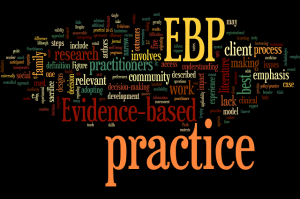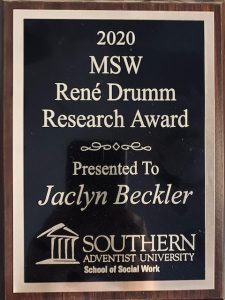
As a social worker, I strive to assist my clients effectively. Research and evidence-based practices are vital components for providing successful support and guidance. I will refer to peer-reviewed articles and literature regularly in my practice to better understand and implement evidence-based practices and approaches for the micro, mezzo, and macro levels of social work. Research allows social workers to develop new knowledge and practices, as well as evaluating efficacy. Also, I am motivated to conduct research to better meet my clients’ needs, advance professionally, and contribute to the social work field.
4.1: Engage in a review of contemporary best practices.
Course Evidence: In my Advanced Policy class, I conducted research on national and Tennessee policies regarding the human right of freedom of speech and exercising that right through protest. This was a group project paper that focused on the Tennessee Protest Law that was passed in 2020. My group created a comprehensive policy plan to repeal the Tennessee Protest Law. I completed the task of researching historical and current policies, major movements, key figures, theoretical and political forces, and public opinions on protesting in America. After extensive research on this topic, I wrote the Protest Policy Literature Review. My Advanced Policy group also completed an Annotated Bibliography for the paper.
Field Evidence: I spent a substantial amount of time reviewing best practices for various social work needs. I learned how to utilize motivational interviewing, Cognitive Behavioral Therapy, Bowen Family Systems Model, Interpersonal Therapy, and Parent-Child Interaction Therapy when helping both foster families and biological families strengthen familial bonds and process conflict negatively affecting the family dynamic. My time spent reviewing these evidence-based models and practices is evidenced in my Practicum Journal Entry. I also spent time teaching the Together Facing the Challenge (TFTC) model, Social Learning Theory, and Antecedent Behavior Consequence (ABC) model to Omni workers and foster families in efforts to help involved adults to understand the presenting behaviors and how to effectively confront them in the foster homes.
Additional Evidence: I created a Traumatic Brain Injury Handout for foster or biological parents to help them better understand TBI and the various ways it may affect their child. The literature-based handout contains an explanation of TBI severity that is typically measured using the Glasgow Coma Scale (GCS). Possible physical, cognitive, and emotional effects of TBI and recommended interventions for each are also included. Caregivers can use this handout as a guide to how to start to understand and plan for their children. Since TBI can affect multiple aspects of an individual and family’s life, considerations for the home and school setting, as well as the family dynamic are essential.
4.2: Conduct research that responds to social work practice needs.
Course Evidence: During my Advanced Administrative Practice: Program Development course, my group created qualitative surveys to gather research concerning the relationship between the Chattanooga citizens and Chattanooga Police Department (CPD). A Community Interview Survey and CPD Police Interview Survey were designed by the group with the intention of also using the Bureau of Justice’s quantitative Public-Police Contact Survey. These surveys would allow our group to research further into strengthening the trust and bond among citizens and the police while creating the program, Community Connect Project with Chattanooga Police Department.
Field Evidence: I conducted a needs assessment in my practicum setting to learn how much Omni Visions Foster Care Resource Coordinators know and understand their roles while providing court-mandated therapeutic visitation with biological families. Often these workers are required to provide therapeutic visitation in place of supervised visitation with biological family members working towards reunification. During my practicum, I realized that the majority of Resource Coordinators lacked training and competency in this area. I created two separate online surveys for this needs assessment. One survey was targeted towards Omni Visions Team Leaders to complete concerning their employees. Every employed Team Leader completed the survey. Results from this survey showed that all Team Leaders would like their employees to receive further training. The second survey was created for the Resource Coordinators to complete regarding their comfort and knowledge on therapeutic visitation. Approximately half of the employed Resource Coordinators completed the survey. Results showed that all of the Resource Coordinators that completed the survey would like further training.
Additional Evidence: I was honored to receive the 2020 Rene Drumm Research Award during my foundation year of the Southern Adventist MSW program. I learned how to review, synthesize, and conduct research during the MSW program.
